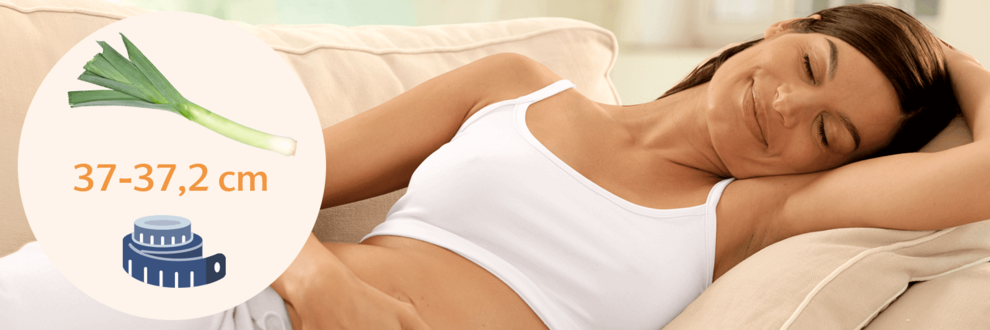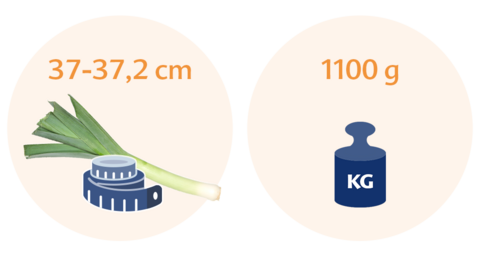Pregnancy weeks:
Week 28 of pregnancy: Your baby’s immune system starts to work

Week 28 is the end of the seventh month of your pregnancy. You’re now in the third and final trimester – which lasts from week 28 to week 40.
Size of your baby in week 28

Your baby is between 37 and 37.2 centimetres in size, about as big as a leek. They now weigh between 1000 and 1100 grams, so they’ve broken the kilogram barrier. From now on, they won’t grow much in length, but they’ll put on plenty of weight.
Your baby’s development
In week 28, your baby begins to absorb antibodies from your blood through the placenta, the first major step in the development of their immune system. These antibodies then encourage your baby’s body to produce its own antibodies to protect against pathogens.
Brain development
Your baby’s brain is becoming increasingly complex as the grooves become more and more pronounced. Increased brain activity, a result of their improved sensory perception, can also be detected by measuring the electrical signals generated by the nerves in their conduction system and the impulses in the brain using an EEG (electroencephalogram).
Lung development
Their lungs are developing just as quickly. The bronchus, the passage that conducts air into their lungs, has divided into the right main and left main bronchi, so that air can flow all the way through their lung tissue once they’re born. Also developed by now are the alveoli, which are crucial for exchanging the fresh, oxygen-rich air they breathe in with the “used” air they breathe out. A special substance called a surfactant is now being produced, which will ensure the alveoli don’t stick together when breathing in and protect the surface of the lungs.
With all this in place, your baby is continuing to practice their breathing. This involves swallowing plenty of amniotic fluid, which can lead to hiccups which you will feel clearly as minor twitching in your belly.
If your baby were to be born premature now, their chances of survival would be pretty good.
Eye development
Your baby’s eyes continue to develop too: when they’re asleep, they close their eyes and, when they’re awake, they open them. They can now distinguish between light and dark, which affects their sleeping patterns, and can vaguely make out colours and shapes. The next stage is the development of their sharp vision, though their eyes still aren’t working properly when they’re born – in fact, their eyesight won’t be fully developed until they’re between one and two years old.
What it’s like for the mum-to-be in week 28
By the end of the seventh month of your pregnancy, you’ll have put on quite a lot of weight. Your bump has grown, which has shifted your centre of gravity and changed how you perceive your body – although there are specific exercises you can do to adjust to your new circumstances. In week 28, you’ll notice more and more symptoms caused by the weight you’ve put on and your growing belly.
Common signs and symptoms
Struggling to get to sleep
Your bump will make it more difficult for you to find a comfortable position in which to lie, so you’ll often find it harder to get to sleep. Not only that, but you’ll struggle to sleep through the night as you toss and turn, trying to find a better sleeping position.
In week 28, the fundus, the top of your womb, will be exactly in the middle of your belly button and costal arch.
Your baby moves more and more
Your baby is using the space they still have in the womb for intensive activity as they practise their movements, which may sometimes disrupt your sleep and disturb your concentration. These forceful movements can also be seen from the outside: every now and then there’ll be a small bulge caused by the pressure from their tiny feet or hands. If you’re expecting twins, this will happen more often, of course.
As a result, the dad-to-be and grandparents-to-be can enjoy having “contact” with your baby. In week 28, it’s not possible to know what exact position your baby is in – they’ll get into any position they like.
Noticing the practice contractions
Your body continues to prepare for birth and practise its contractions: every now and again, without warning, you’ll feel your belly tighten for about a minute or so. This won’t be painful, and it isn’t in any way dangerous for your baby.
Your uterus squeezes your other organs
As well as struggling to sleep through the night, you’ll need to go to the toilet to pee a lot more often during the day. This is because your uterus and your baby are squeezing against your bladder, reducing its size. Furthermore, your uterus is also putting pressure on other organs, which can result in heartburn or pain in your kidneys.
Sore legs
Swollen feet and ankles, heavy legs (especially in summer) and muscle cramps are other common symptoms experienced by pregnant women at this stage. So take care of yourself:
- Make sure you get plenty of rest!
- Remember to eat a healthy diet with lots of magnesium! Sit or lie down with your legs raised as often as you can!
Raising your legs will boost your blood and tissue water circulation and stop blood and tissue water “settling” in your lower extremities.
Find out more about the nutrients you need right now to avoid or minimise these symptoms.
Questions you may want to ask your doctor
Getting help for varicose veins
If you frequently experience pain in your legs, or if you suffered from varicose or spider veins before your pregnancy, your doctor will be able to tell you if it’s medically relevant. It may be that you’re genetically predisposed towards getting varicose veins, in which case this symptom is more than just a visual defect. Your doctor can help prevent thrombosis, which will sometimes involve therapy or preventive treatment. In this case and depending on what your job involves, the first step would be to wear compression tights (which are highly elastic and so prevent blood settling in your lower legs) when standing and walking around.



